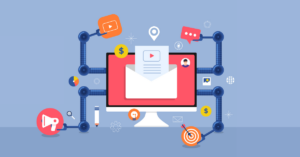So, you’ve decided to invest in marketing automation technology for your healthcare organization—great decision! You’re probably excited about all the digital “magic” that will streamline your patient communications and marketing tasks. While a marketing automation platform like emfluence can undoubtedly help you do all that and more, it’s essential to know that you’ll also need to invest some time in the setup process to get the most out of the system.
You can think about the implementation process in the same way you might help a patient maintain their health through a program of medical intervention, exercise and diet. Simply handing them a leaflet won’t deliver results. They’ll need to follow a well-planned regimen with consistency and dedication to see progress.
For marketing automation to work effectively in the healthcare setting, you’ll need to design the right workflows, segment your audience accurately, craft engaging content, and regularly adjust your strategy based on data insights. Your audience is at the heart of this process, and their involvement is crucial to its success.
10 Steps to Implementing Marketing Automation in the Healthcare Industry
To help marketers in the healthcare industry make the most of their investment in marketing automation technology, we’ve compiled the following ten-step implementation program to help you achieve the best outcomes for your patients and your organization.
- Define Clear Marketing Objectives: Start by identifying your key objectives. What do you actually want to achieve with your marketing automation strategy? Objectives might include increasing patient engagement, improving appointment attendance, enhancing patient retention or boosting new patient lead conversion rates. Clear objectives will guide your strategy and help your organization measure ongoing success as you implement automation tools and roll out your new campaign strategies. Remember, if you don’t have a clear marketing objective, how will you ever know if you’ve been successful or not?
- Select the Right Marketing Automation Platform: Choosing a marketing automation platform that meets all the needs of the healthcare industry is vital to your success. You’ll need to ensure that the platform includes the key features you need to achieve your objectives, including patient segmentation, email marketing, SMS, and campaign tracking/reporting capabilities. Equally importantly, the platform must comply with rigid healthcare regulations like HIPAA in the U.S. and GDPR in the EU and offer secure data handling, encryption, and access controls to protect sensitive patient information. Full compliance with these regulations is essential to avoid hefty fines and build patient trust by safeguarding their data. If you are wondering, of course, the emfluence Marketing Platform ticks all those boxes.
- Segment Your Audience: Take your time to break your patient lists and lead databases down into distinct and manageable groups based on their demographics, medical history, conditions, treatment preferences, and behaviors. Segmentation allows for more targeted and relevant messaging, enabling better engagement and improved response rates to your marketing efforts. This is all part of the process of delivering the right message to the right person at the right time.
- Create Targeted Campaigns: Develop specific marketing campaigns aimed at each patient segment. You can use automated email drip campaigns and SMS notifications to deliver educational content that addresses each group’s unique needs and interests. For example, a campaign for patients with high blood pressure might offer tips for managing their condition, check-up reminders, and promotions for related services.
- Personalize Your Communications: Use patient data, such as medical history and appointment schedules, to send personalized messages that resonate with each patient. Tailor reminders for follow-up appointments, offer personalized healthcare tips, and send recommendations based on individual medical conditions or past visits. Personalized communication not only improves patient loyalty but also strengthens the patient-provider relationship and enhances patient engagement.
- Automate Appointment Reminders and Follow-ups: Automating appointment reminders via email or SMS helps reduce no-shows and ensures patients stay on track with their healthcare schedules. Similarly, sending automated follow-up communications after appointments (e.g., thank you messages, post-visit surveys, or recommendations for further care) increases patient engagement and improves outcomes and satisfaction.
- Integrate with Existing Systems: Ensure your marketing automation platform integrates smoothly with existing systems like Electronic Health Records (EHR), Customer Relationship Management (CRM) software, or patient portals. This enables you to leverage patient data more effectively, delivering highly personalized and timely communications.
- Monitor Patient Consent: Implement mechanisms to collect, store, and manage patient consent for receiving marketing communications. It’s crucial to respect patient privacy and ensure they have control over their data. Ensure patients can easily opt-in and out of email, SMS, or other marketing channels. This not only ensures compliance with those previously mentioned data privacy regulations but also reinforces patient trust and helps build a positive patient-provider relationship.
- Analyze and Optimize Campaigns: Consistently monitor key performance indicators (KPIs), such as open rates, click-through rates, and conversion rates, and take the time to solicit and analyze patient feedback. Use this data to evaluate the success of your campaigns. Regular analysis allows you to tweak your strategy, improve engagement, and increase the effectiveness of your marketing efforts over time.
- Train Your Team: Equip your marketing and clinical team with the knowledge and skills to use your marketing automation tools effectively. Training should cover both the technical aspects of the platform and the regulatory requirements specific to healthcare marketing. This ensures the team is well-versed in leveraging the latest marketing automation technology while maintaining compliance and patient privacy. Your team’s role is integral to the success of this process, and their value cannot be overstated.
Book an Appointment with a Healthcare Marketing Expert Today
Discover how the emfluence Marketing Platform can help you create engaging, relevant, and informative healthcare marketing campaigns that drive your organization’s goals and better serve your patients. Reach out to the healthcare marketing experts today to book an appointment, schedule a demo, and learn more at expert@emfluence.com.


